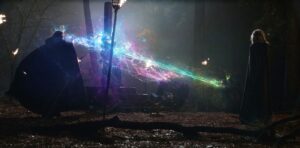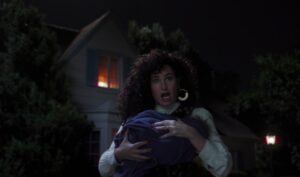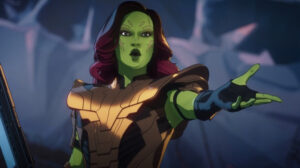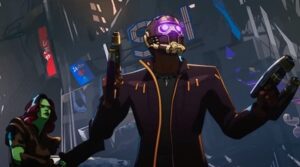It’s simultaneously unfair and unsurprising that the conversation around Eternals has been dominated by discourse about the film’s abysmal Rotten Tomatoes score. Marvel Studios very obviously wanted Eternals to resonate with critics, and they were confident enough in its ability to do so that they reserved the film a spot in the Rome Film Festival in the expectation that it would lead to favorable word-of-mouth and kick off a strong awards season campaign – so when it didn’t, and Eternals instead got saddled with the dishonorable distinction of becoming Marvel’s first “rotten” entry, everyone took notice.

Of course, the initial critical reception led to backlash from fans. But with everyone pointlessly bickering about whether it’s critics who are too biased against superhero films or fans these days who are too easy to please, it’s hard to get a word in edgewise about Eternals itself – its merits and its flaws. And having now seen the film, I think that’s both unfair and ironic, given how much of the story revolves around the subject of nuance, which is sorely lacking from most online arguments. Baseless declarations are great if all you’re looking for is attention, but to paraphrase my man Kingo (Kumail Nanjiani), don’t do it for the views.
Eternals is primarily a story about the complexity of being human, and the various nuances that comprise our individual personalities, ideologies, creeds, virtues, and vices. Provided with an all-star cast of ten main characters representing a broad spectrum of gender identities, races, ethnicities, body types, sexual identities, ages, and disabilities, through which to explore all of these nuances, director Chloé Zhao jumps at the chance. Eternals is intimately engrossed in the personal lives of all its titular characters, and Zhao’s camera is especially fascinated with parsing out how these god-like beings either embrace the trappings of humanity, or else reject it, in their mannerisms, fashion choices, found families, and careers.
And yet at the same time, all of the Eternals – those who choose to immerse themselves in human culture as much as those who isolate themselves in enforced solitude – are keenly aware that they are meant to be othered. The MCU has an understandable desire to try and humanize even its most outlandish cosmic characters, from Thor to the Guardians of the Galaxy, but the dichotomy of the Eternals is that most of them desire to be human without understanding fully the responsibility of being human and sharing a planet with billions of other people. Whether descending from the stars in eerily perfect formation or striding gracefully into battle, the Eternals have an aloofness that isn’t easily cast aside.
These are the same unearthly qualities that have earned the Eternals a place in mythology, revered under many different names as gods and heroes around the globe. There were concerns prior to the film’s release that the Eternals would take credit for the accomplishments of early humans in much the same way that (usually racist) conspiracy theorists attribute the construction of ancient landmarks across South America and Africa to aliens, but I feel that the film mostly steers clear of that pitfall. There are one or two weird plot-holes, but everything starts to make more sense as the full backstory of the Eternals comes to light in the second act.
As a history buff, I really wanted to enjoy the film’s frequent movements across time to events and regions we don’t often get to see onscreen, from the heyday of Babylon to the fall of Tenochtitlan, as well as scattered references and allusions (some of which are…extremely poetic) to the mythological counterparts of the Eternals. But as a viewer and a critic, this is one glaring weak-spot in Chloé Zhao’s screenplay (cowritten with Kaz and Ryan Firpo), which strains to remain laser-focused on its ten characters across a span of seven-thousand years.
Every flashback sequence in the film is beautifully shot, featuring lavish production design and an impressive attention to detail, but the transitions between past and present feel increasingly random and even clumsy as the film goes on, and the flashbacks are so long that it feels like you’re switching between two separate storylines rather than enjoying a single cohesive narrative; both storylines are almost equally compelling, mind you, but neither is given the necessary space to breathe. Keeping track of so many dates and trying to piece together what’s happening when and in what order is also more of a chore than it likely needs to be.
The characters who suffer most as a result are Ajak (Salma Hayek at her most elegant), whose arc is sprinkled over a couple of scenes placed at roughly opposite ends of this gargantuan film; and Sersi (a disappointingly mellow Gemma Chan), who fades in and out of the story, never fully solidifying into a three-dimensional character, much less the face of the franchise that she’s theoretically intended to be. Her contributions to humanity’s development as one of the team’s five scholars are left rather vague, and her transmutative powers – while visually stunning – are poorly defined. Miss or forget an early reference to Sersi being unable to transmutate sentient beings, and nothing that happens afterwards will make sense.

Seeing as there are currently no other Eternals projects in development that urgently require these characters, I wouldn’t have objected if this first film were either set entirely in the past like Captain Marvel, or almost entirely in the present, following the format of Neil Gaiman’s run in the comics, in which the Eternals were mind-wiped by Sprite (Lia McHugh) and only slowly regained awareness of who they used to be…which, interestingly, is also like Captain Marvel. Neither alternative would make for an objectively better movie, and I think Eternals is still very enjoyable regardless, but sometimes less is more, and this is one of those instances.
It’s doubly frustrating because otherwise, Chloé Zhao really gets that – more so than any Marvel director before her. Her filmmaking style is simplistic, even stark. She doesn’t shy away from using CGI, but at the same time she’s careful to always be artistic with it, crafting intricate designs and patterns from the tendrils of sinuous golden energy that cling to the Eternals. Kingo has his finger-guns and Ikaris his laser-eyes, but Zhao goes to great lengths to ensure that neither character clogs the screen with meaningless energy-blasts and explosions, the bane of most MCU action sequences.
Zhao also displays an extraordinary talent for directing character-driven action with an emphasis on teamwork – comparable, dare I say it, to the Russo Brothers’ work on Captain America: Civil War, which is pretty much the gold standard for superhero action, as far as I’m concerned. Because the Eternals all possess visually consistent powers, I don’t know if audiences will necessarily feel the same way, but Zhao knows exactly how to play with her characters’ strengths and weaknesses, whom to pair up on the battlefield, and how to ensure that every hero has at least one awesome moment. Given how frequently Marvel movies fall apart in their third act, it’s commendable that Eternals truly delivers on an epic and emotional finale.
In particular, I want to give shout-outs to both Angelina Jolie and Lauren Ridloff. Jolie instantly commands the screen with an effortless majesty befitting one of Hollywood’s last real movie-stars, and she draws on her background in action to craft a unique fighting style for the warrior goddess Thena, both ethereal and efficient. But the true revelation of Eternals is Ridloff’s Makkari, the MCU’s first deaf superhero. Ridloff has an incredible physicality that helps Makkari stand out as arguably the coolest speedster around. Instead of simply running, Makkari springs across continents, causing sonic booms whenever her feet touch the ground, and Ridloff sells that raw power with ease.
His role isn’t as action-heavy until the third act, but Brian Tyree Henry also makes a strong impression as Phastos, the team’s tech genius and inventor. Although we only get to see the bare-bones of his character arc (another fault of the split-timeline), there’s so much substance to his story that it’s honestly a mystery why he’s not the main character. After eagerly encouraging humanity’s progress for centuries, Phastos is left dumbfounded and disillusioned in the wake of the atomic bombings of Hiroshima and Nagasaki, unable to wrap his head around the human capacity for destruction on such a vast scale.
In the present day, we discover that Phastos’ husband and son are his only remaining link to humanity, which allows for a few touching moments between the family – including the MCU’s first onscreen gay kiss. It’s a lovely kiss, but in a film that also boasts the MCU’s first awkwardly modest attempt at a sex scene between Sersi and her partner Ikaris (Richard Madden), it’s sad that it’s still groundbreaking for two men to even display the most basic form of romantic affection for each other onscreen. The door is officially open for more solid LGBTQ+ representation in the MCU, but only a smidge.
With all these characters and their individual storylines, there’s already a lot going on in Eternals before you even get to the overarching plot, everything having to do with the Celestials and the villainous Deviants, the winding backstory of the Eternals themselves, and a score of other small worldbuilding details that should have been simplified or excised entirely to help the whole movie flow with the same grace as any one of its characters. Zhao relies heavily on long exposition-heavy monologues (and even an opening credits crawl, à la Star Wars) to make sure you don’t accidentally miss anything, but if the effect she was going for was biblical, she succeeded a little too well.
To use a comparison I hope most of my readership will understand, there were several points in the film where I remembered how normal people feel when they read The Silmarillion for the first time, how I myself felt when I read The Silmarillion for the first time: disoriented by a seemingly endless deluge of information and names, while still entranced by it all. But if anything, that bodes well for Eternals‘ rewatchability factor. It took me a long time to try reading The Silmarillion in full after my first unsuccessful attempt, but when I did, and when I finally got it, everything changed. It’s one of my favorite books now.

I will likely discuss Eternals‘ mid-credits and post-credits scenes in a separate post, but for now I want you to leave you with this note. If Eternals is dense and disjointed, it also has heart, soul, beauty, and genuinely thought-provoking themes – all of which are lacking in several Marvel films considered “fresh” by critics. Zhao’s film resists any generalization, just as she argues through Eternals that there is no universal definition of goodness, and that we are all far more complex and multi-faceted than we often choose or want to believe.
Movie Rating: 8.5/10








